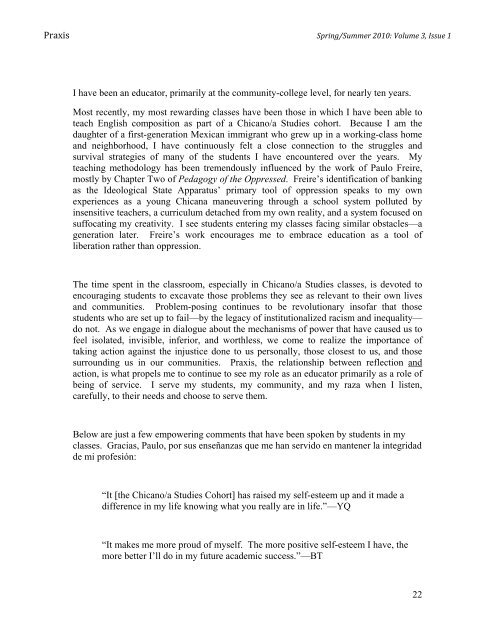PRAXIS - Paulo Freire Institute
PRAXIS - Paulo Freire Institute
PRAXIS - Paulo Freire Institute
- No tags were found...
Create successful ePaper yourself
Turn your PDF publications into a flip-book with our unique Google optimized e-Paper software.
Praxis Spring/Summer 2010: Volume 3, Issue 1<br />
I have been an educator, primarily at the community-college level, for nearly ten years.<br />
Most recently, my most rewarding classes have been those in which I have been able to<br />
teach English composition as part of a Chicano/a Studies cohort. Because I am the<br />
daughter of a first-generation Mexican immigrant who grew up in a working-class home<br />
and neighborhood, I have continuously felt a close connection to the struggles and<br />
survival strategies of many of the students I have encountered over the years. My<br />
teaching methodology has been tremendously influenced by the work of <strong>Paulo</strong> <strong>Freire</strong>,<br />
mostly by Chapter Two of Pedagogy of the Oppressed. <strong>Freire</strong>’s identification of banking<br />
as the Ideological State Apparatus’ primary tool of oppression speaks to my own<br />
experiences as a young Chicana maneuvering through a school system polluted by<br />
insensitive teachers, a curriculum detached from my own reality, and a system focused on<br />
suffocating my creativity. I see students entering my classes facing similar obstacles—a<br />
generation later. <strong>Freire</strong>’s work encourages me to embrace education as a tool of<br />
liberation rather than oppression.<br />
The time spent in the classroom, especially in Chicano/a Studies classes, is devoted to<br />
encouraging students to excavate those problems they see as relevant to their own lives<br />
and communities. Problem-posing continues to be revolutionary insofar that those<br />
students who are set up to fail—by the legacy of institutionalized racism and inequality—<br />
do not. As we engage in dialogue about the mechanisms of power that have caused us to<br />
feel isolated, invisible, inferior, and worthless, we come to realize the importance of<br />
taking action against the injustice done to us personally, those closest to us, and those<br />
surrounding us in our communities. Praxis, the relationship between reflection and<br />
action, is what propels me to continue to see my role as an educator primarily as a role of<br />
being of service. I serve my students, my community, and my raza when I listen,<br />
carefully, to their needs and choose to serve them.<br />
Below are just a few empowering comments that have been spoken by students in my<br />
classes. Gracias, <strong>Paulo</strong>, por sus enseñanzas que me han servido en mantener la integridad<br />
de mi profesión:<br />
“It [the Chicano/a Studies Cohort] has raised my self-esteem up and it made a<br />
difference in my life knowing what you really are in life.”—YQ<br />
“It makes me more proud of myself. The more positive self-esteem I have, the<br />
more better I’ll do in my future academic success.”—BT<br />
22


